The Intel SSD 330 Review (60GB, 120GB, 180GB)
by Anand Lal Shimpi on August 1, 2012 12:01 AM ESTThe Test
| CPU | Intel Core i7 2600K running at 3.4GHz (Turbo & EIST Disabled) - for AT SB 2011, AS SSD & ATTO |
| Motherboard: | Intel DH67BL Motherboard |
| Chipset: | Intel H67 |
| Chipset Drivers: | Intel 9.1.1.1015 + Intel RST 10.2 |
| Memory: | Corsair Vengeance DDR3-1333 2 x 2GB (7-7-7-20) |
| Video Card: | eVGA GeForce GTX 285 |
| Video Drivers: | NVIDIA ForceWare 190.38 64-bit |
| Desktop Resolution: | 1920 x 1200 |
| OS: | Windows 7 x64 |
Random Read/Write Speed
The four corners of SSD performance are as follows: random read, random write, sequential read and sequential write speed. Random accesses are generally small in size, while sequential accesses tend to be larger and thus we have the four Iometer tests we use in all of our reviews.
Our first test writes 4KB in a completely random pattern over an 8GB space of the drive to simulate the sort of random access that you'd see on an OS drive (even this is more stressful than a normal desktop user would see). I perform three concurrent IOs and run the test for 3 minutes. The results reported are in average MB/s over the entire time. We use both standard pseudo randomly generated data for each write as well as fully random data to show you both the maximum and minimum performance offered by SandForce based drives in these tests. The average performance of SF drives will likely be somewhere in between the two values for each drive you see in the graphs. For an understanding of why this matters, read our original SandForce article.
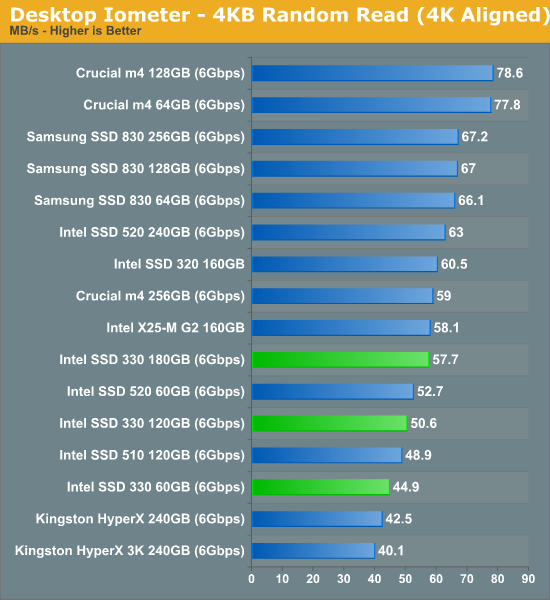
At similar capacities, the 330 and 520 offer nearly identical random read performance. The old X25-M G2 actually offers better random read performance than many of the newer drives, although most users would be hard pressed to tell the difference in actual usage.
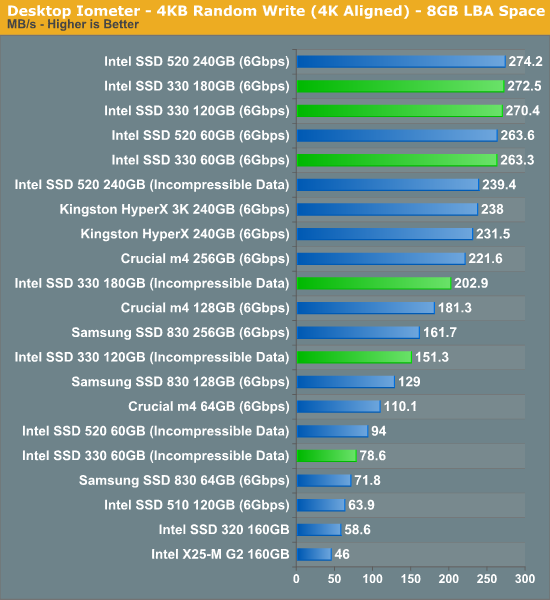
Random write performance is great with easily compressible data, but even when faced with data that can't be reduced the Intel SSD 330 does very well. Once again performance is very similar between the 330 and 520 drives.
Many of you have asked for random write performance at higher queue depths. What I have below is our 4KB random write test performed at a queue depth of 32 instead of 3. While the vast majority of desktop usage models experience queue depths of 0 - 5, higher depths are possible in heavy I/O (and multi-user) workloads:
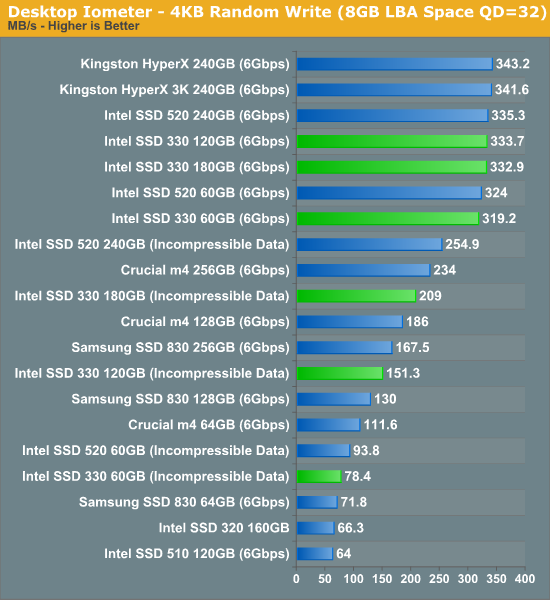
Sequential Read/Write Speed
To measure sequential performance I ran a 1 minute long 128KB sequential test over the entire span of the drive at a queue depth of 1. The results reported are in average MB/s over the entire test length.
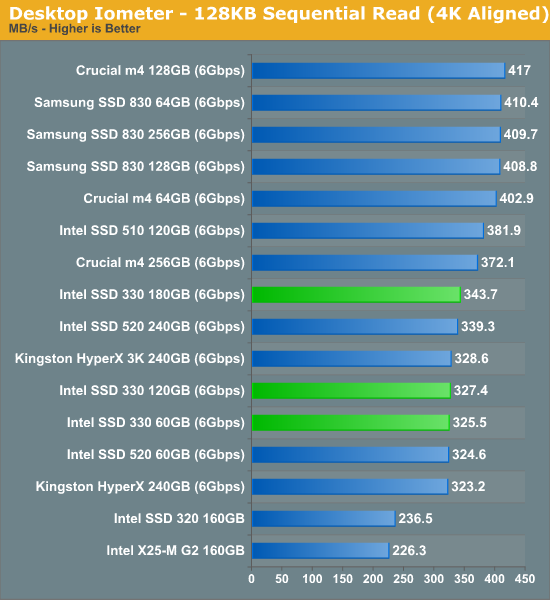
Low queue depth sequential read performance is good but not exactly class leading. Once again there's no real performance difference between the 330 and 520.
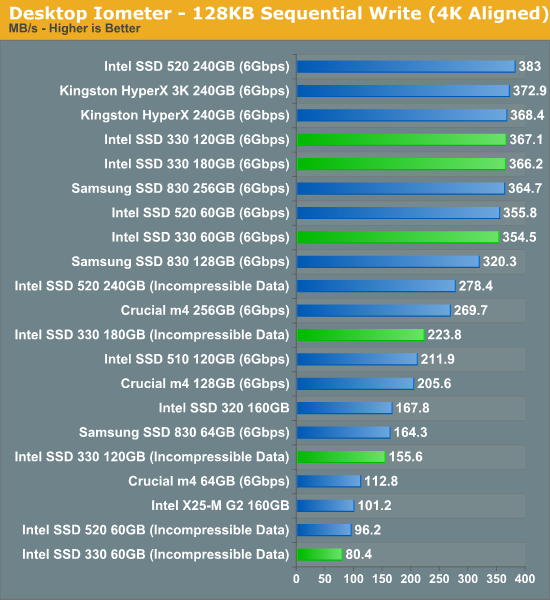
Sequential write performance with incompressible data is the biggest downside to any SandForce based drive. Try copying a compressed video or photos to the drive and you'll get speeds south of 230MB/s. The 60GB drive can only manage 80MB/s with incompressible data, that's actually no faster than the old Intel X25-M.
AS-SSD Incompressible Sequential Performance
The AS-SSD sequential benchmark uses incompressible data for all of its transfers. The result is a pretty big reduction in sequential write speed on SandForce based controllers.
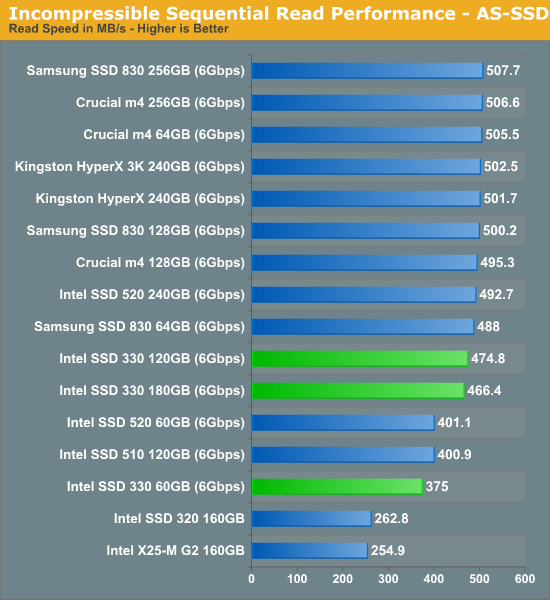
Here we see what higher queue depth sequential reads look like. The 330 gets close to 500MB/s but never actually exceeds it.
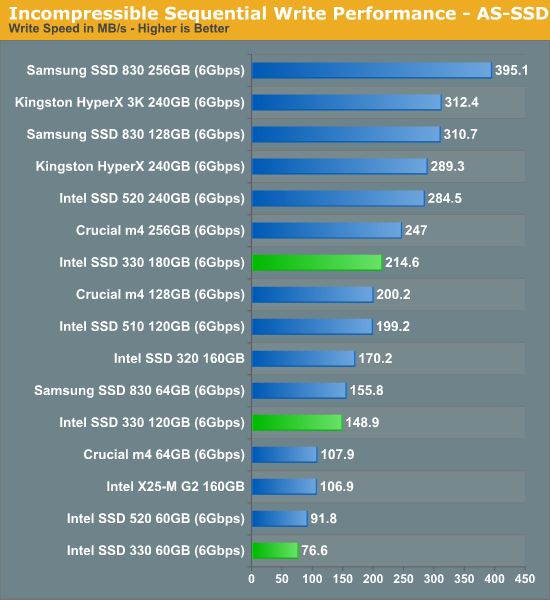
Incompressible sequential write performance, again, doesn't look very good.










64 Comments
View All Comments
Ryan Smith - Wednesday, August 1, 2012 - link
"I just wish Anand more honest by telling people the truth about SSD, specially SF based controller, because after trying more than 5 SF based SSD, I can say they're sucks! buy it only if you're planning to reformat your drive every now and then"So far every problem we've encountered with SF-2xxx has been documented, e.g. http://www.anandtech.com/show/5508/intel-ssd-520-r...
Beyond that we haven't encountered any additional SF-2xxx issues in our extended deployment testing. For example the 520 (330's sibling) is currently in one of my systems, having replaced a 120GB Vertex 2 that just recently passed 2 years of service.
amikey - Wednesday, August 1, 2012 - link
I have a 180GB SSD 330 in my 2009 Macbook Pro 13". It's totally fine, and running better than ever.Haven't enabled trim or updated the firmware since I got it (no pc to use) either.
I don't use disk encryption though, if you were to do that go with something else.
angelsmaster - Tuesday, September 4, 2012 - link
hi, you didn't update it or whatever? is it still up and running? and i think, its not trim supported when i checked it in the S-ATA system report, btw, i am using a macbook pro 15" 2011... thanks..quanstro - Wednesday, August 1, 2012 - link
how did you get this kind of experience with a just-released drive in a year-old computer?Jumpman23 - Wednesday, August 1, 2012 - link
In terms of cost and reliability the 330 seems like a good deal. What about in terms of performance and reliability? I've been hearing not so good things about the SF drives in general. The M4's and Samsung's 830 seems to get good reviews. So is there any particular drive that stands out as the best of the best?Per Hansson - Wednesday, August 1, 2012 - link
OCZ has a really poor track record when you look at RMA's:http://www.behardware.com/articles/862-7/component...
Weather this is due to the BSOD issue or other issue with their Sandforce drives I don't know.
But if you look at future data even OCZ's Petrol & Octane series has really bad RMA rates:
http://www.behardware.com/articles/862-8/component...
This makes me kind of weary of any Sandforce drive, we can see that since Intel has released Sandforce drives their failure rate has gone from 0.6% > 1.73% in the first link above.
This could be because of the "8MB bug" only but I am not convinced.
I would go for the Crucial M4 drive at this point, it has a great track record and only one known very specific problem (BSOD after 50k hours of ontime, caused by a bug in the SMART values & fixed by a firmware update)
Kristian Vättö - Wednesday, August 1, 2012 - link
The problem with those statistics is that they are extremely limited. Only four manufacturers are listed, and only OCZ's numbers are reported for individual models. The only info on sample size is that there must have been over 500 sales (brand) or 100 sales (model).I'm not defending OCZ or any other brand, just pointing out that a more thorough study would be needed to really know what SSDs are reliable. I do agree that Crucial's m4 is a great buy at the moment, and Samsung 830 and Plextor's SSDs are too.
lyeoh - Wednesday, August 1, 2012 - link
Only OCZ's numbers are reported for individual models becausequoting the article: "only OCZ has models with rates of above 5%".
You may need a more thorough study, but it's good enough for me to avoid OCZ.
Per Hansson - Wednesday, August 1, 2012 - link
Yea, it's a limited sample size but it's all we have to go on.We can also look at Newegg reviews, sure it has it's drawbacks aswell but when you see stuff like this it paints a quite clear picture I think:
128GB OCZ Petrol: http://www.newegg.com/Product/Product.aspx?Item=N8...
128GB OCZ Octane: http://www.newegg.com/Product/Product.aspx?Item=N8...
120GB OCZ RevoDrive 3: http://www.newegg.com/Product/Product.aspx?Item=20...
240GB OCZ Vertex 3: http://www.newegg.com/Product/Product.aspx?Item=N8...
128GB OCZ Vertex 4: http://www.newegg.com/Product/Product.aspx?Item=N8...
128GB Crucial M4: http://www.newegg.com/Product/Product.aspx?Item=N8...
antef - Wednesday, August 1, 2012 - link
I recommend the m4, it's been an amazing drive for me and the reviews on Newegg and Amazon are out of this world, the kind of thing you don't see very often. Don't fret over exact performance and worry that a newer drive might net you something slightly higher, all of these are crazy fast, my Windows machine with the m4 stays on the loading screen for all of 3 seconds, not even enough time to see the four colored orbs form together into the Windows logo.